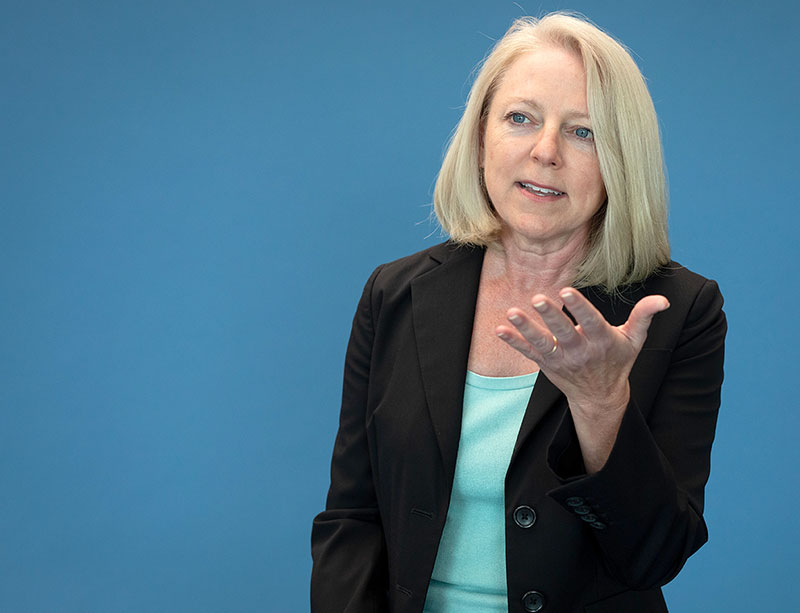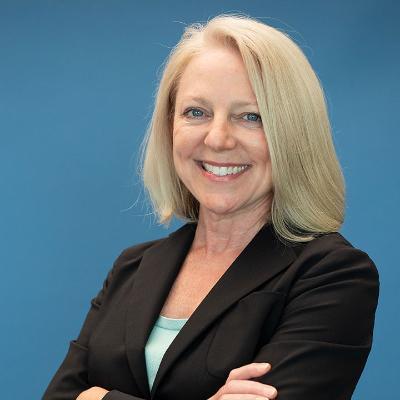
It's not every day that a dean begins their tenure during both a global pandemic and a national reckoning on race relations. But that's exactly how Michelle D. Young, Ph.D., started her deanship at Loyola Marymount University's School of Education in July 2020. In addition to guiding LMU SOE through a challenging period of virtual instruction and seismic shifts in education overall, Dean Young earned several honors and leadership positions in professional organizations that sought her expertise and skills during her first year as dean. A nationally renowned scholar in educational leadership, she had previously served as professor and department chair of educational leadership, foundations and policy at the University of Virginia, and was executive director of the University Council for Educational Administration (UCEA) for 19 years. Here, Dean Young reflects upon her first year as dean and shares future goals for LMU's SOE.
Let's talk about the Black Lives Matter activism of summer 2020, which had major momentum when you first set foot (virtually) on LMU's campus. What was it like to begin a new leadership role during that time?
Our faculty, staff and I began conversations about BLM and racial equity right away. First, I should make it clear that LMU SOE has been engaged in equity work since its inception. We are a Jesuit institution founded on the principle of using education to foster a more just world. Our signature doctoral program in educational leadership is still one of the only such programs in the U.S. that is taught specifically through the lens of cultivating social justice.

At the same time, the summer of 2020 brought us to a deeper understanding of the systemic and structural racism that persists, and compelled us to look more deeply into our own policies and practices. I'm proud that in the past year, we've taken many concrete steps toward building an actively anti-racist institution. Last fall we formed a results-oriented Diversity Action Committee (DAC), which hosted several professional development workshops and brought in guest speakers on the topic of anti-Black racism. I appointed one of its co-chairs, Will Perez, to the inaugural role of associate dean of diversity, equity, and inclusion in January 2021. He is leading the effort to ensure that everything we do—from admissions to hiring, from curricular development to cultivating partner organizations—is carried out with an eye toward dismantling racism. This fall we've initiated a cluster hire of five faculty members to fill critical vacancies and deepen our expertise in this area.
None of this work is easy or quick. But we are being extremely intentional about it, and we engage our candidates in these efforts whenever appropriate. They are the future educators who will carry out this work themselves throughout their professional careers.
One area in which LMU SOE has been particularly active is advocacy for English learners (ELs). Tell us more.
For 15 years, our Center for Equity for English Learners (CEEL) has conducted research, hosted professional development events, and engaged in policy work with the goal of improving educational outcomes for this community. In the 2019-20 school year, there were approximately 1.148 million English learners in California public schools alone—nearly 19% of public-school enrollment in the state. As educators, we must ensure that these children become proficient in English and support them in meeting grade-level academic standards to help close the opportunity gap. CEEL's efforts became even more critical during the pandemic, as research showed that certain student groups, including ELs, fell further behind compared to others.
As a recognized national leader in bilingual teacher education, CEEL has made significant contributions to standards and policy, particularly in the state of California. In 2021 the California Commission on Teacher Credentialing (CTC) used CEEL's research as the basis for updated draft bilingual authorization standards. In February, CEEL hosted its annual Jornada conference online for the first time due to the pandemic. It attracted its largest-ever audience, including VIPs from the U.S. and Mexican consulates. The high turnout points to the real need for community-building and advocacy, at which CEEL excels.
The pandemic spawned efforts to support preK-12 students in the local community. Can you share some successes?
LMU SOE was a key founding partner in a couple of free tutoring programs that proved very effective. Good Tutors matched preK-12 students from more than 500 low-income families in the Los Angeles Unified School District with nearly 200 student volunteers from LMU, who offered virtual tutoring and social-emotional support. SOE trained all the volunteers; many of them were our own candidates, but a significant number were students enrolled in other colleges and schools at LMU. We got a lot of wonderful feedback. One volunteer even helped a high-school senior fill out her college applications, and that young woman is now first to go in her family. In a similar vein, this past summer we worked with the Urban League and other partners to launch a program called Cultivating Young Black Excellence; you can read more about it in this year's impact report. Through these efforts and partnerships such as our Family of Schools and Upward Bound programs, we strive to serve the students and families right in our own backyard in Los Angeles.
Accelerated learning has emerged as a frequent topic of conversation lately, as a means of helping students catch up on learning that they might have missed during the pandemic or otherwise. What's your take on this issue?
In a nutshell, the practice involves putting students' strengths and abilities at the center of focus and prioritizing resources like scheduling of class time and staffing from that lens. Studies indicate that accelerated instruction is not only a more effective strategy than "teaching to the middle, " it is also anti-racist, as students of color are disproportionately represented in "remedial" and "catch-up" classes that only reinforce racism and ableism.
This summer, I took a team of our faculty to a multi-day conference on accelerated instruction to deepen our understanding of the latest research and best practice in this area. Our faculty are now in the process of developing and implementing changes to curriculum and clinical experiences that incorporate best practices into our teacher preparation and educational leadership programs. It is always our intention to offer research-based and anti-racist strategies such as this one.
Speaking of teaching methods, the SOE adopted virtual-reality technology for a few of its programs this year. How did that come about?
LMU SOE is fortunate to be home to the iDEAL Institute, which works alongside schools and districts on best practices for use of educational technology. As you might imagine, this issue took on extra importance during the pandemic. One of our iDEAL staff, whose dissertation research focused on Mursion simulations, supported our incorporation of this technology into multiple educator preparation programs; you can read more in our impact report. In a nutshell, these simulations offer a way to rehearse real-life scenarios, which helps our candidates strengthen their skills and ultimately become more confident and comfortable in professional settings. Unlike many schools of education, we've expanded its use beyond teacher preparation to include school psychology, educational leadership, and counseling courses. So far, our candidates and our faculty alike are finding the simulations to be incredibly powerful learning tools.
Overall, what are some key takeaways that you hope stick within the educational field in the wake of the pandemic?
I'd say two things. First, it's important that we actively confront and assuage the trauma that Covid-19 has caused. Our field was deeply affected by losses of life as well as the mad scramble to shift to teaching and learning online. It might feel like the peak of the crisis has abated, but in the aftermath, we're seeing the ripple effects: burnout, anxiety, depression. We must meet people where they are and give people the social and emotional support they need to process all that has happened—students, teachers, school leaders, administrators.
Second, we must use this opportunity to reimagine schools and other educational communities as fully equitable spaces that benefit all students, their families, and the educators who serve them. Never before have education and educators been so front and center in our national conversation, and the deep inequities of our systems were laid bare during the pandemic. We can and must do better—our future depends on it.
The barriers to change can feel very steep at times, but education is a field where there are many improvements to be made. I'm thrilled to be leading LMU SOE during this time of radical transformation. And I'm confident that our talented candidates, faculty, staff, and alumni will take the knowledge and values that we instill in them to become change agents who transform their fields.